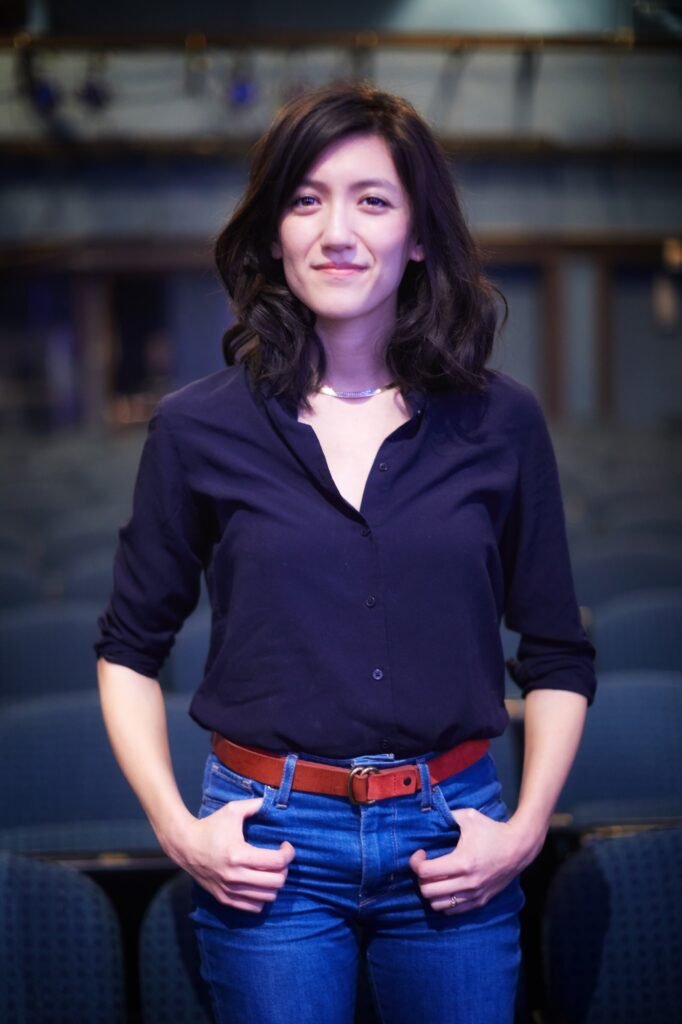Our interview with Anna Moench, playwright behind 'Sin Eaters'

Q: Mary Lee, the main character of Sin Eaters, plays a content moderator for a fictitious social media company. What was your early inspiration for the show and how did you go about researching the topics presented in it?
I learned about the existence of content moderators a decade ago, and found it fascinating. I wanted to write about it, but didn’t have an access point at the time (or so I thought) since I didn’t work in tech. As it turned out, I didn’t realize how deeply unhappy I was in my day job at the time, a job in an industry that has legal but unethical practices. I thought that I could make decent money and continue writing. But of course, anything we spend the majority of our waking hours doing has an effect on us. I became more irritable, more selfish, angrier… there came a moment when I realized I was turning into someone I didn’t like. I ended up leaving that job and changing a lot of things in my life, and that’s when I realized how I could write Sin Eaters. It’s about content moderation and social media, but it’s also about working a job that takes something from you, and you’re willing to give that piece of yourself in exchange for a paycheck. The research was pretty straightforward when it came to the nuts and bolts of content moderation, there’s a lot of great reporting out there that helped me understand this profession. But I was laying my own personal experience over that research and that’s what made it possible for me to write this play at last.
Q: The subject of content moderation has become a major and very public issue for social media platforms in the last few months alone. Has your perspective on ‘Sin Eaters’ changed at all in wake of recent events?
I wrote this play in 2015. I wish the events of 2016-2021 had proven this play wrong, but that hasn’t happened. This is a problem that won’t go away easily. Banning disinformation and Nazis is a start, so maybe we’re on the right path, we’ll see.
Q: The way you wrote the script for Sin Eaters makes it feel as though one moment fades directly into the next, further blurring the lines between Mary Lee’s personal and work life. How do you personally relate to that experience? What message did you want to send the audience?
That’s how it feels when you’re stuck in that cycle. You wake up in a crappy apartment that exhausts you, go to a crappy job that exhausts you, go home to your crappy apartment that exhausts you, get a fitful night of sleep, and do it all over again the next day. I love it when the formal container of the play is a storytelling device in and of itself, whether that is an emotional experience, a physical one, etc.
Q: It’s been a difficult year for live entertainment andperformers around the world. How have you used your time during quarantine andwhat lessons would you share with aspiring playwrights during this time?
I didn’t expect how hard it would be to write plays during this time, but that’s been my experience. I feel a strong need to be hearing the heartbeat of theater in order to write plays, just knowing that productions are happening out there, going to see them and thinking, “Wow, how did they do that? What do I have in response to this?”, friends in rehearsals, hearing how someone’s tech is going, all of that. And of course, it’s incredibly sad that an artistic industry that was already so financially strapped is unable to function for well over a year. It’s difficult to write plays now because I don’t know what the world is going to look like when they’re produced, and it is so bizarre to have a conversation with people in a completely unknown reality. I guess that’s always the case to some extent, but in my own life I haven’t experienced such a rapid pace of change and enormous societal upheaval before. I have no brilliant advice. Write if you can. Don’t beat yourself up if you can’t. Trust that there will be a time when you can again, and in the meantime just pay attention to what’s happening around you, I guess. That’s what I’m trying to do.
Q: What would you like the audience to take away from Sin Eaters?
On one level, this is a play about the permeability of our souls. Most of us know what it’s like to work a job that is destroying you on the inside and realizing it too late. So on that level, we’re Mary. But on another level, we are the unseen users of the company that employs her, and I hope the play makes people consider that as well. Some of us can outsource the dirty work of our lives, and we’ve gotten really good at obscuring and forgetting the fact that real people are the ones who do that dirty work. There’s human labor behind so many of the things that seem automated, whether that’s a social media feed or same-day delivery or a $5 t-shirt. I would love for more people to lift the rock and look underneath once in a while. To see who is doing the work to make your life easier, and to demand that they are given a safe workplace and equitable pay. There is a reason companies want to make things seem magical to the consumer.
